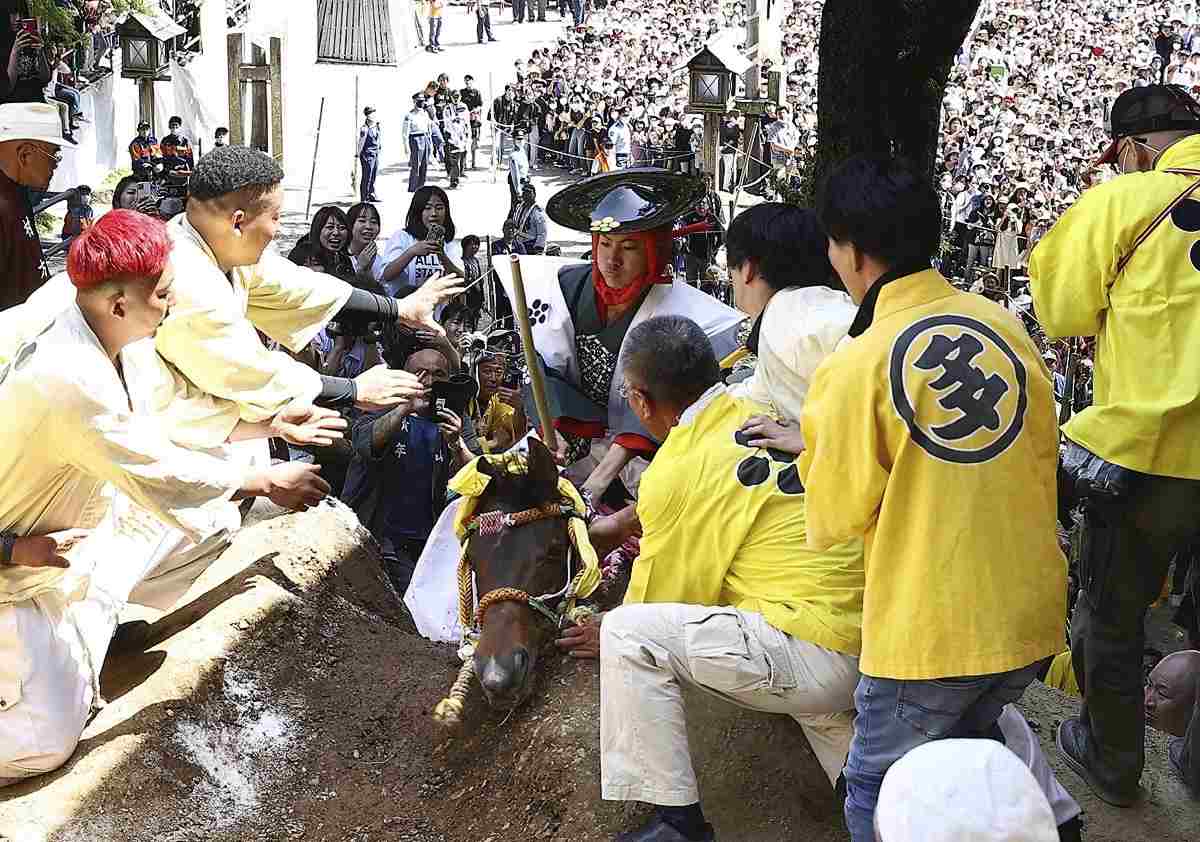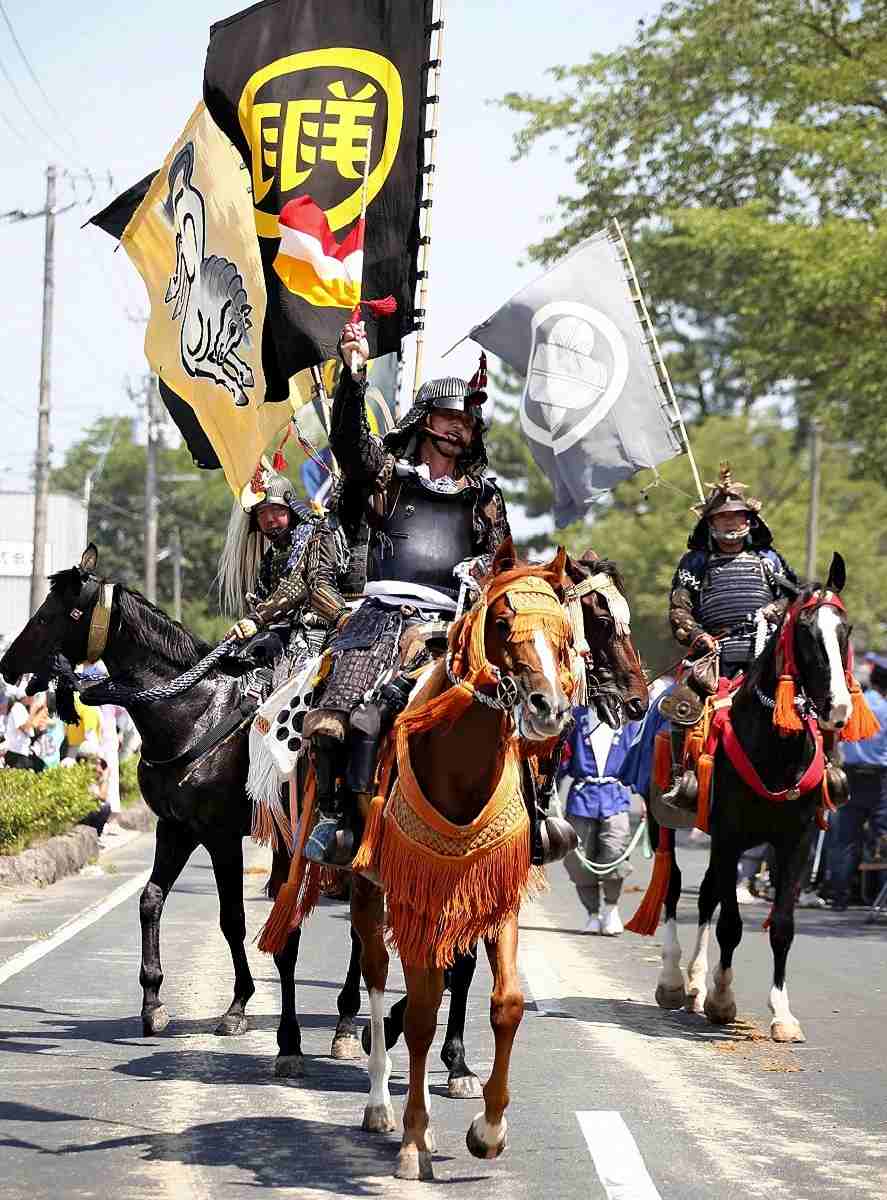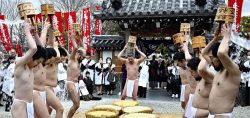
A horse tries to jump over a wall set at the top of a steep slope during the Ageuma Shinji festival at the Tado shrine in Kuwana, Mie Prefecture.
13:00 JST, December 17, 2023
Traditional festivals using animals in various parts of the country are increasingly pressured to be reconsidered from the perspective of animal welfare. Animal abuse criticism is growing over how animals are treated in such festivals, which sometimes result in killing or injuring them. Organizers try to find a balance between the continuation of traditions and considerations for animals, seeking ways to adapt events to be appropriate for today’s society.
50,000 online signatures
In May, a horse was put down after it fell and broke its leg while ascending a slope during the Ageuma Shinji festival at the Tado shrine in Kuwana, Mie Prefecture. The shrine received a flood of protests with people saying things like, “You can’t treat the horse’s life like a single-use product,” and, “You all should receive divine punishment.” More than 50,000 online signatures calling for the abolition of the festival were submitted to the Mie prefectural government.
The Ageuma Shinji is a Shinto ritual in which horses, carrying young riders wearing a jingasa war hat and traditional clothing, ascend a steep slope and then try to jump over a 1.5-meter-tall wall set on top of the slope. It is believed that the year’s crop harvest can be predicted by how many times the horses successfully jump over the wall.
The festival is said to date back nearly 700 years and was designated by the prefecture as an intangible folk cultural property.
While the festival has a long and distinguished history, it is seen as problematic because some participants have abused the horses in the past. Animal welfare organizations have protested the festival many times since the late 1990s. In 2010 and 2014, a total of three horses were put down after they broke their legs during the festival. In August this year, the prefectural board of education issued recommendations for improvement.
The shrine will take measures to address the situation, such as making the slope less steep and lowering the height of the wall starting from next year.
Balancing tradition and animal care
Under the animal protection law, killing or injuring animals without due cause is prohibited and someone who violates the law will face up to five years in prison or other punishments. “The use of animals could be justified if it is a tradition that has taken root in the community,” an official of the Environment Ministry said. “But if the use exceeds the socially acceptable level, it could constitute animal abuse.”
The Itoman Hare festival is a traditional boat racing event conducted in early summer in Itoman, Okinawa Prefecture, to pray for good catches and safety of sea trips. Festival organizers and an animal welfare organization are fiercely opposing each other over whether or not a duck catching competition with local young people violates the animal protection law.
In the competition in question, ducks are thrown into the sea and participants swim after the ducks and catch them by hand. Then the participants bring back the ducks they caught for eating. According to the Itoman municipal board of education, documents from the Ryukyu Kingdom in the 18th century include a record of the Hare festival. The duck catching competition is believed to have originated in China from around the same period.
In the past, some participants held the ducks by the neck or feathers in a rough way, so the Okinawa prefectural animal welfare and control center asked the organizers to review the use of live ducks in 2018. The Tokyo-based nonprofit organization Animal Rights Center submitted written charges against a total of three people, including this year’s festival participants and the representative of the organizing committee, to the Okinawa prefectural police, claiming that they had violated the animal protection law.
However, the Hare festival organizing committee decided in August to hold the duck catching competition in next year’s festival, too. “Ducks are part of Itoman’s food culture,” a member of the committee said without showing any sign of compromise. “It is an important culture for our community aimed at helping young people get familiar with the sea and we cannot accept the criticism that we are abusing animals.”
Event dates changed

The Soma Nomaoi festival features cavalcade of samurai warriors on horses.
Some organizers flexibly operate their events in order to protect animals. The Soma Nomaoi festival in the Soso region of Fukushima Prefecture, which features a cavalcade of more than 400 samurai warriors on horses moving through town streets, has usually been held at the end of July. However, organizers plan to move next year’s festival to the end of May. This is because 111 horses were pulled from events due to possible heatstroke and 2 died in this year’s festival.
Ryosuke Okamoto, professor of sociology of tourism at Hokkaido University, said, “Festivals and rituals have recently become tourist attractions and people involved in those events need to be aware of outside scrutiny. I think it is important to maintain the essence of their respective traditional events while, at the same time, making necessary changes to fit the times and social trends. ”
Top Articles in Society
-

Producer Behind Pop Group XG Arrested for Cocaine Possession
-

Man Infected with Measles Reportedly Dined at Restaurant in Tokyo Station
-

Woman with Measles Visited Hospital in Tokyo Multiple Times Before Being Diagnosed with Disease
-

Bus Carrying 40 Passengers Catches Fire on Chuo Expressway; All Evacuate Safely
-

Tokyo Skytree’s Elevator Stops, Trapping 20 People; All Rescued (Update 1)
JN ACCESS RANKING
-

Producer Behind Pop Group XG Arrested for Cocaine Possession
-

Japan PM Takaichi’s Cabinet Resigns en Masse
-

Man Infected with Measles Reportedly Dined at Restaurant in Tokyo Station
-

Israeli Ambassador to Japan Speaks about Japan’s Role in the Reconstruction of Gaza
-

Videos Plagiarized, Reposted with False Subtitles Claiming ‘Ryukyu Belongs to China’; Anti-China False Information Also Posted in Japan

























